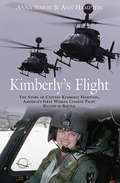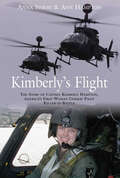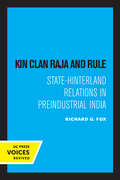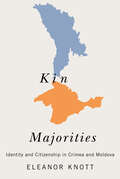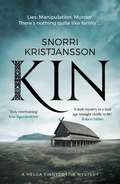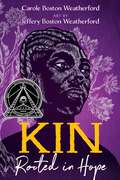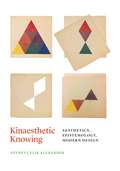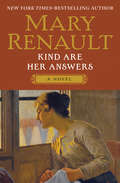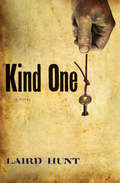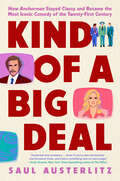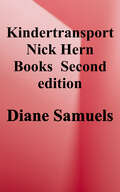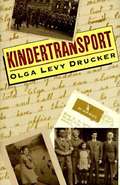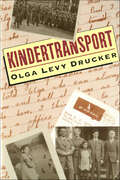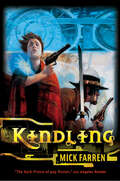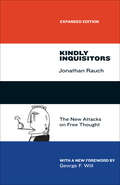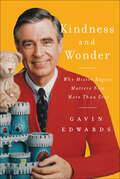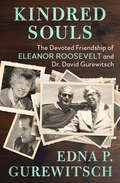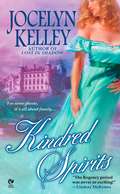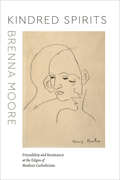- Table View
- List View
Kimberly's Flight
by Ann Hampton Anna SimonUS Army Captain Kimberly N. Hampton was living her dream: flying armed helicopters in combat and commanding D Troop, 1st Squadron, 17th Cavalry, the armed reconnaissance aviation squadron of the 82nd Airborne Division. An all-American girl from a small Southern mill town, Hampton was a top scholar, student body president, ROTC battalion commander, and highly ranked college tennis player. In 1998, she was commissioned as a second lieutenant in the army. Driven by determination and ambition, Hampton rapidly rose through the ranks in the almost all-male bastion of military aviation to command a combat aviation troop. On January 2, 2004, Captain Hampton was flying an OH-58D Kiowa Warrior helicopter above Fallujah, Iraq, in support of a raid on an illicit weapons marketplace, searching for an elusive sniper on the rooftops below. A little past noon, her helicopter was wracked by an explosion. A heat-seeking surface-to-air missile had knocked off the helicopter's tail boom. The helicopter crashed, killing Hampton. Kimberly's Flight is the story of Captain Hampton's exemplary life. This story is told through nearly fifty interviews and her own e-mails to family and friends, and is entwined with her mother's narrative of loving and losing a child.
Kimberly's Flight: The Story of Captain Kimberly Hampton, America's First Woman Combat Pilot Killed in Battle
by Ann Hampton Anna Simon“The story of an outstanding young woman who realized her ambition to rise in military, fly helicopters and lead soldiers into combat.” —Independent MailU.S. Army Captain Kimberly N. Hampton was living her dream: flying armed helicopters in combat and commanding D Troop, 1st Squadron, 17th Cavalry, the armed reconnaissance aviation squadron of the 82nd Airborne Division. An all-American girl from a small southern mill town, Kimberly was a top scholar, student body president, ROTC battalion commander, and highly ranked college tennis player. In 1998 she was commissioned as a second lieutenant in the Army. Then, driven by determination and ambition, Kimberly rapidly rose through the ranks in the almost all-male bastion of military aviation to command a combat aviation troop. On January 2, 2004, Captain Hampton was flying an OH-58D Kiowa Warrior helicopter above Fallujah, Iraq, in support of a raid on an illicit weapons marketplace, searching for an illusive sniper on the rooftops of the city. A little past noon her helicopter was wracked by an explosion. A heat-seeking surface-to-air missile had gone into the exhaust and knocked off the helicopter’s tail boom. The helicopter crashed, killing Kimberly. Kimberly’s Flight is the story of Captain Hampton’s exemplary life. This story is told through nearly fifty interviews and her own e-mails to family and friends, and is entwined with Ann Hampton’s narrative of loving and losing a child. “This inspiring story of self discipline, leadership, patriotism and sacrifice should be required reading for a country far removed from the concept of total war. Even the war’s staunchest critics will enjoy this unromanticized picture of heroism.” —On Point: The Journal of Army History
Kin Clan Raja and Rule: State-Hinterland Relations in Preindustrial India (Center for South and Southeast Asia Studies, UC Berkeley)
by Richard G. FoxThis title is part of UC Press's Voices Revived program, which commemorates University of California Press’s mission to seek out and cultivate the brightest minds and give them voice, reach, and impact. Drawing on a backlist dating to 1893, Voices Revived makes high-quality, peer-reviewed scholarship accessible once again using print-on-demand technology. This title was originally published in 1971.
Kin Majorities: Identity and Citizenship in Crimea and Moldova
by Eleanor KnottIn Moldova, the number of dual citizens has risen exponentially in the last decades. Before annexation, many saw Russia as granting citizenship to—or passportizing—large numbers in Crimea. Both are regions with kin majorities: local majorities claimed as co-ethnic by external states offering citizenship, among other benefits. As functioning citizens of the states in which they reside, kin majorities do not need to acquire citizenship from an external state. Yet many do so in high numbers.Kin Majorities explores why these communities engage with dual citizenship and how this intersects, or not, with identity. Analyzing data collected from ordinary people in Crimea and Moldova in 2012 and 2013, just before Russia’s annexation of Crimea, Eleanor Knott provides a crucial window into Russian identification in a time of calm. Perhaps surprisingly, the discourse and practice of Russian citizenship was largely absent in Crimea before annexation. Comparing the situation in Crimea with the strong presence of Romanian citizenship in Moldova, Knott explores two rarely researched cases from the ground up, shedding light on why Romanian citizenship was more prevalent and popular in Moldova than Russian citizenship in Crimea, and to what extent identity helps explain the difference.Kin Majorities offers a fresh and nuanced perspective on how citizenship interacts with cross-border and local identities, with crucial implications for the politics of geography, nation, and kin-states, as well as broader understandings of post-Soviet politics.
Kin: A dark, intense and compelling Viking mystery
by Snorri Kristjansson'For Vikings done right, come to Snorri Kristjansson' - Mark Lawrence'Truly entertaining' - Yrsa Sigurðardóttir'A dark mystery in a dark age brought vividly to life' - Robert FabbriEveryone loves a family reunion.970: For the first time since Helga was adopted, her family will be gathered in one place. But her siblings are coming with darkness in their hearts. Everyone knows their father, the Viking warlord Unnthor Reginsson, has a great chest of gold hidden somewhere on his land - and each of his heirs is determined to find it. Then one morning Helga is awakened by screams. Blood has been shed. Kin has been slain. All the clues point to one person - who cannot possibly be the murderer, at least in Helga's eyes. But if she's going to save an innocent from the axe, she's got to solve the mystery - fast . . .Lies. Manipulation. Murder. There's nothing quite like family . . .
Kin: A dark, intense and compelling Viking mystery (The Helga Finnsdottir Mysteries #1)
by Snorri Kristjansson'For Vikings done right, come to Snorri Kristjansson' - Mark Lawrence'Truly entertaining' - Yrsa Sigurðardóttir'A dark mystery in a dark age brought vividly to life' - Robert FabbriEveryone loves a family reunion. 970: For the first time since Helga was adopted, her family will be gathered in one place. But her siblings are coming with darkness in their hearts. Everyone knows their father, the Viking warlord Unnthor Reginsson, has a great chest of gold hidden somewhere on his land - and each of his heirs is determined to find it. Then one morning Helga is awakened by screams. Blood has been shed. Kin has been slain. All the clues point to one person - who cannot possibly be the murderer, at least in Helga's eyes. But if she's going to save an innocent from the axe, she's got to solve the mystery - fast . . . Lies. Manipulation. Murder. There's nothing quite like family . . .
Kin: How We Came to Know Our Microbe Relatives
by John L. IngrahamBy unlocking the evolutionary information contained in cells, biologists have been able to construct the Tree of Life and show that its three main stems are dominated by microbes. Plants and animals constitute a small upper branch in one stem. Soon we may know how life began over 3.5 billion years ago. John Ingraham tells this story of discovery.
Kin: Rooted in Hope
by Carole Boston WeatherfordA Coretta Scott King Honor Book An &“imaginative and moving&” (The Horn Book, starred review) portrait of a Black family tree shaped by enslavement and freedom, rendered in searing poems by acclaimed author Carole Boston Weatherford and stunning art by her son Jeffery Boston Weatherford.I call their names: Abram Alice Amey Arianna Antiqua I call their names: Isaac Jake James Jenny Jim Every last one, property of the Lloyds, the state&’s preeminent enslavers. Every last one, with a mind of their own and a story that ain&’t yet been told. Till now. Carole and Jeffery Boston Weatherford&’s ancestors are among the founders of Maryland. Their family history there extends more than three hundred years, but as with the genealogical searches of many African Americans with roots in slavery, their family tree can only be traced back five generations before going dark. And so from scraps of history, Carole and Jeffery have conjured the voices of their kin, creating an often painful but ultimately empowering story of who their people were in a breathtaking book that is at once deeply personal yet all too universal. Carole&’s poems capture voices ranging from her ancestors to Frederick Douglass to Harriet Tubman to the plantation house and land itself that connects them all, and Jeffery&’s evocative illustrations help carry the story from the first mention of a forebear listed as property in a 1781 ledger to he and his mother&’s homegoing trip to Africa in 2016. Shaped by loss, erasure, and ultimate reclamation, this is the story of not only Carole and Jeffery&’s family, but of countless other Black families in America.
Kinaesthetic Knowing: Aesthetics, Epistemology, Modern Design
by Zeynep Çelik AlexanderIs all knowledge the product of thought? Or can the physical interactions of the body with the world produce reliable knowledge? In late-nineteenth-century Europe, scientists, artists, and other intellectuals theorized the latter as a new way of knowing, which Zeynep Çelik Alexander here dubs “kinaesthetic knowing.” In this book, Alexander offers the first major intellectual history of kinaesthetic knowing and its influence on the formation of modern art and architecture and especially modern design education. Focusing in particular on Germany and tracing the story up to the start of World War II, Alexander reveals the tension between intellectual meditation and immediate experience to be at the heart of the modern discourse of aesthetics, playing a major part in the artistic and teaching practices of numerous key figures of the period, including Heinrich Wölfflin, Hermann Obrist, August Endell, László Moholy-Nagy, and many others. Ultimately, she shows, kinaesthetic knowing did not become the foundation of the human sciences, as some of its advocates had hoped, but it did lay the groundwork—at such institutions as the Bauhaus—for modern art and architecture in the twentieth century.
Kind Are Her Answers: A Novel (Vmc Ser. #67)
by Mary RenaultAn &“extraordinarily moving&” novel about a doctor trapped between his wife and his lover, by a New York Times–bestselling author (Boston Herald). Doctor Kit Anderson is starting to see his marriage in a new light. Relations are strained with Janet, his beautiful wife, who now strikes him as petty and narcissistic. With no shortage of work to busy him, Anderson resigns himself to the consolations of professional life—that is, until he meets Christie, the great-niece of a dying patient. Warm and vivacious, Christie stands in stark contrast to Kit&’s wife, and suggests hope of a second and more passionate act to his life. How long can their affair be kept secret, though, and does Kit want the best for Christie, or only for himself?
Kind One: A Novel
by Laird Hunt<P>As a teenage girl, Ginny marries Linus Lancaster, her mother's second cousin, and moves to his Kentucky pig farm "ninety miles from nowhere." <P>In the shadows of the lush Kentucky landscape, Ginny discovers the empty promises of Linus' "paradise"--a place where the charms of her husband fall away to reveal a troubled man and cruel slave owner. Ginny befriends the young slaves Cleome and Zinnia who work at the farm--until Linus' attentions turn to them, and she finds herself torn between her husband and only companions. <P>The events that follow Linus' death change all three women for life. Haunting, chilling, and suspenseful, Kind One is a powerful tale of redemption and human endurance in antebellum America. <P>Laird Hunt is the author of several works of fiction and a finalist for the 2010 PEN Center USA Award in Fiction. Currently on the faculty of the University of Denver's creative writing program, he and his wife, the poet Eleni Sikelianos, live in Boulder, Colorado, with their daughter, Eva Grace.
Kind of a Big Deal: How Anchorman Stayed Classy and Became the Most Iconic Comedy of the Twenty-First Century
by Saul AusterlitzFrom the author of Generation Friends, featuring brand-new interviews with Will Ferrell and Adam McKay, a surprising, incisive, and often hilarious book about the film that changed comedy, Anchorman. It&’s been nearly twenty years since Ron Burgundy burst into movie fans&’ lives, reminding San Diego to &“stay classy&” while lampooning a time gone by—although maybe not as far gone as we might think? In Kind of a Big Deal, comedy historian Saul Austerlitz tells the history of how Anchorman was developed, written, and cast, and how it launched the careers of future superstars like Will Ferrell, Steve Carell, and Paul Rudd, also setting the stage for a whole decade of comedy to come and influencing films like The 40-Year-Old Virgin, Talladega Nights, Knocked Up, Superbad, and so many more. But Kind of a Big Deal isn&’t only a celebration of Anchorman—it&’s also a cultural analysis of the film&’s significance as a sly commentary on feminism, the media, fragile masculinity, 1970s nostalgia, and more. Featuring brand-new interviews with stars such as Will Ferrell, director Adam McKay, and other key players, the book includes insider commentary alongside updated pop-culture analysis. And it also shares surprising stories and facts: from the film&’s original conception as a plane crash/cannibal comedy mashup to the surprising, real-life newscaster who inspired the character of Veronica. Overall, this is a celebration of a movie that millions love—but it&’s also an unsparing look back at what has and hasn&’t changed, since the 1970s and since 2004. Perfect for fans of the film and anyone who cares about comedy today, Kind of a Big Deal proves that the movie was, and is, exactly that.
Kindergarten
by Peter RushforthA mixture of "present-day" 1980 English boarding school, World War II and attempts to save Jewish children. Part of the story is told in flashbacks. Many side stories tell of conditions in Berlin.
Kindertransport
by Diane SamuelsA modern classic about one woman's struggle to come to terms with her past. Brutally separated from her German Jewish parents at the age of nine, Eva is brought to England with the promise of a new life…. <p><p>Between 1939 until the outbreak of World War II, nearly 10,000 Jewish children were taken from their families in Nazi-occupied Germany and sent to live with foster families in Britain. Diane Samuels' seminal play, Kindertransport, imagines the fate of one such child. <p><p>Now widely considered a modern classic, Kindertransport has been read and studied the world over. Kindertransport won the 1992 Verity Bargate Award and was subsequently staged by the Soho Theatre Company at the Cockpit Theatre in London in 1993. It also won the Meyer-Whitworth Award in 1993. Since its premiere the play has been revived several times. Watford Palace Theatre staged it in 1996, in a production that transferred to the West End. Renowned theatre company Shared Experience also revived the play to great acclaim for a regional tour in 2007. <p><p> This edition includes several personal memoirs by German-born children whose lives were saved, and transformed, by the Kindertransport.
Kindertransport
by Olga Levy DruckerThe author describes the circumstances in Germany after Hitler came to power that led to the evacuation of many Jewish children to England and her experiences as a young girl in England during World War II.
Kindertransport
by Olga Levy DruckerMama and I climbed aboard. I waved to Papa until he was only a tiny speck in the distance. The train turned the curve, and he was gone.The powerful autobiographical account of a young girls' struggle as a Jewish refugee in England from 1939–1945.
Kindling (Flame of Evil)
by Mick FarrenThe last bastions of freedom, the Kingdom of Albany and the Norse Alliance, stand at bay. They are threatened by the Empire of the Mosul, whose unstoppable forces, driven by the brutal theocracy of the Zhaithan and drawn by the promise of paradise, have already conquered most of Europe and now set their sights on the New World.There is one slim chance of salvation. Four youngsters must find each other, and themselves, to form an entity that can challenge the Dark Things, warrior demons raised by the necromancy of the Zhaithan. But the Four are widely scattered. Argo Weaver, fleeing his East Virginia home to escape a brutal stepfather, is concerned only with his own survival. Lady Cordelia Blakeney, aristocratic and decorative adjunct to the Army of Albany, cares more for the fit of her uniform than the state of the world. Jesamine is the slave-concubine of a brutal Teuton colonel. Raphael Vega, Hispanian conscript in the army of the Mosul, must hide his artistic talents from the heresy-seeking priests.And even with the help of the mysterious Yancey Slide, who may not be entirely human, the obstacles they face may well be insurmountable.At the Publisher's request, this title is being sold without Digital Rights Management Software (DRM) applied.
Kindly Inquisitors: The New Attacks on Free Thought, Expanded Edition
by Jonathan Rauch"A liberal society stands on the proposition that we should all take seriously the idea that we might be wrong. This means we must place no one, including ourselves, beyond the reach of criticism; it means that we must allow people to err, even where the error offends and upsets, as it often will. ” So writes Jonathan Rauch in Kindly Inquisitors, which has challenged readers for more than twenty years with its bracing and provocative exploration of the issues surrounding attempts to limit free speech. In it, Rauch makes a persuasive argument for the value of "liberal science” and the idea that conflicting views produce knowledge within society. In this expanded edition of Kindly Inquisitors, a new foreword by George F. Will strikingly shows the book’s continued relevance, while a substantial new afterword by Rauch elaborates upon his original argument and brings it fully up to date. Two decades after the book’s initial publication, while some progress has been made, the regulation of hate speech has grown domestically--especially in American universities--and has spread even more internationally, where there is no First Amendment to serve as a meaningful check. But the answer to bias and prejudice, Rauch argues, is pluralism--not purism. Rather than attempting to legislate bias and prejudice out of existence or to drive them underground, we must pit them against one another to foster a more vigorous and fruitful discussion. It is this process that has been responsible for the growing acceptance of the moral acceptability of homosexuality over the last twenty years. And it is this process, Rauch argues, that will enable us as a society to replace hate with knowledge, both ethical and empirical. "It is a melancholy fact that this elegant book, which is slender and sharp as a stiletto, is needed, now even more than two decades ago. Armed with it, readers can slice through the pernicious ideas that are producing the still-thickening thicket of rules, codes, and regulations restricting freedom of thought and expression. ”--George F. Will, from the foreword
Kindness and Wonder: Why Mister Rogers Matters Now More Than Ever
by Gavin EdwardsNew York Times–bestselling Author: “A crisply told biography” of Fred Rogers that “vibrantly captures [his] spirit and wisdom.” —Publishers WeeklyFor more than thirty years, Fred Rogers was a beloved fixture in American homes. Warm and welcoming, he spoke directly to children—and their parents—about the marvels of the world, the things that worried them, and above all, the importance of being themselves. Dressed in his cardigan and sneakers, the creator and host of Mister Rogers’ Neighborhood offered a wholesome message of generosity and love that changed the landscape of television and shaped a generation of children. Kindness and Wonder pays tribute to this cultural icon: the unique, gentle man who embodied the best of what we could be.Looking back at the history of the show and the visionary behind it, Gavin Edwards reminds us of the indelible lessons and insights that Mister Rogers conveyed—what it means to be a good person, to be open-hearted, to be thoughtful, to be curious, to be compassionate—and why they matter. Infused with Mister Rogers’ gentle spirit, and featuring dozens of interviews with people whose lives were touched by Fred Rogers—ranging from Rita Moreno to NFL Hall of Famer Lynn Swann—Kindness and Wonder is a love letter to this unforgettable cultural hero and role model, and the beautiful neighborhood he created.“Fred Rogers is the closest thing we have to a secular American saint . . . This book pays tribute to the man who helped raise so many of us and argues the case that his wisdom is more essential than ever.” —USA Today
Kindred Souls: The Devoted Friendship of Eleanor Roosevelt and Dr. David Gurewitsch
by Edna P. GurewitschThe poignant and unforgettable true account of the deep, loving friendship between a handsome physician and the former First Lady"I love you as I love and have never loved anyone else." --Eleanor Roosevelt in a letter to Dr. David Gurewitsch, 1955 She was the most famous and admired woman in America. He was a strikingly handsome doctor, eighteen years her junior. Eleanor Roosevelt first met David Gurewitsch in 1944. He was making a house call to a patient when the door opened to reveal the wife of the president of the United States, who had come to help her sick friend. A year later, Gurewitsch was Mrs. Roosevelt's personal physician, on his way to becoming the great lady's dearest companion--a relationship that would endure until Mrs. Roosevelt's death in 1962. Recounting the details of this remarkable union is an intimately involved chronicler: Gurewitsch's wife, Edna. Kindred Souls is a rare love story--the tale of a friendship between two extraordinary people, based on trust, exchange of confidences, and profound interest in and respect for each other's work. With perceptiveness, compassion, admiration, and deep affection, the author recalls the final decade and a half of the former First Lady's exceptional life, from her first encounter with the man who would become Mrs. Gurewitsch's husband through the blossoming of a unique bond and platonic love. Blended into her tender reminiscences are excerpts from the enduring correspondence between Dr. Gurewitsch and the First Lady, and a collection of personal photographs of the Gurewitsch and Roosevelt families. The result is a revealing portrait of one of the twentieth century's most beloved icons in the last years of her life--a woman whom the author warmly praises as "one of the few people in this world in which greatness and modesty could coexist."
Kindred Spirits
by Jocelyn KelleyThe Nethercott sisters return-and start believing in ghosts The Nethercott sisters-China, Jade, and Sian-recently lost their beloved father, who believed in ghosts with all his heart. Still, China is shocked when she sees a ghost in a Roman centurion's garb. Quintus Valerius is cursed to remain on earth until he can save one of his descendants from murder-work that has been done in vain, until now. With the help of China, he intends to save Alexander, Major Lord Braddock. Although Alexander balks at taking advice and protection from a ghost and a woman, China still can't keep herself from thinking of the handsome war hero in some very improper ways. But she's soon to learn the second half of the curse that Quintus forgot to mention: China's destiny may be tied to Alexander's-and equally deadly.
Kindred Spirits: Friendship and Resistance at the Edges of Modern Catholicism (Class 200: New Studies in Religion)
by Brenna MooreKindred Spirits takes us inside a remarkable network of Catholic historians, theologians, poets, and activists who pushed against both the far-right surge in interwar Europe and the secularizing tendencies of the leftist movements active in the early to mid-twentieth century. With meticulous attention to the complexity of real lives, Brenna Moore explores how this group sought a middle way anchored in “spiritual friendship”—religiously meaningful friendship understood as uniquely capable of facing social and political challenges. For this group, spiritual friendship was inseparable from resistance to European xenophobia and nationalism, anti-racist activism in the United States, and solidarity with Muslims during the Algerian War. Friendship, they believed, was a key to both divine and human realms, a means of accessing the transcendent while also engaging with our social and political existence. Some of the figures are still well known—philosopher Jacques Maritain, Nobel Prize laureate Gabriela Mistral, influential Islamicist Louis Massignon, poet of the Harlem renaissance Claude McKay—while others have unjustly faded from memory. Much more than an idealized portrait of a remarkable group of Catholic intellectuals from the past, Kindred Spirits is a compelling exploration of both the beauty and flaws of a vibrant social network worth remembering.
Kindred Spirits: Friendship and Resistance at the Edges of Modern Catholicism (Class 200: New Studies in Religion)
by Brenna MooreKindred Spirits takes us inside a remarkable network of Catholic historians, theologians, poets, and activists who pushed against both the far-right surge in interwar Europe and the secularizing tendencies of the leftist movements active in the early to mid-twentieth century. With meticulous attention to the complexity of real lives, Brenna Moore explores how this group sought a middle way anchored in “spiritual friendship”—religiously meaningful friendship understood as uniquely capable of facing social and political challenges. For this group, spiritual friendship was inseparable from resistance to European xenophobia and nationalism, anti-racist activism in the United States, and solidarity with Muslims during the Algerian War. Friendship, they believed, was a key to both divine and human realms, a means of accessing the transcendent while also engaging with our social and political existence. Some of the figures are still well known—philosopher Jacques Maritain, Nobel Prize laureate Gabriela Mistral, influential Islamicist Louis Massignon, poet of the Harlem renaissance Claude McKay—while others have unjustly faded from memory. Much more than an idealized portrait of a remarkable group of Catholic intellectuals from the past, Kindred Spirits is a compelling exploration of both the beauty and flaws of a vibrant social network worth remembering.
Kindred Spirits: Friendship and Resistance at the Edges of Modern Catholicism (Class 200: New Studies in Religion)
by Brenna MooreKindred Spirits takes us inside a remarkable network of Catholic historians, theologians, poets, and activists who pushed against both the far-right surge in interwar Europe and the secularizing tendencies of the leftist movements active in the early to mid-twentieth century. With meticulous attention to the complexity of real lives, Brenna Moore explores how this group sought a middle way anchored in “spiritual friendship”—religiously meaningful friendship understood as uniquely capable of facing social and political challenges. For this group, spiritual friendship was inseparable from resistance to European xenophobia and nationalism, anti-racist activism in the United States, and solidarity with Muslims during the Algerian War. Friendship, they believed, was a key to both divine and human realms, a means of accessing the transcendent while also engaging with our social and political existence. Some of the figures are still well known—philosopher Jacques Maritain, Nobel Prize laureate Gabriela Mistral, influential Islamicist Louis Massignon, poet of the Harlem renaissance Claude McKay—while others have unjustly faded from memory. Much more than an idealized portrait of a remarkable group of Catholic intellectuals from the past, Kindred Spirits is a compelling exploration of both the beauty and flaws of a vibrant social network worth remembering.
Kindred Spirits: Shilombish Ittibachvffa
by Leslie Stall WidenerA nonfiction picture book about the inspiring true pay-it-forward story that bridges two continents, 175 years, and two events in history--connecting Ireland, Choctaw Nation, Navajo Nation, and the Hopi Tribe.1845. The Potato Famine devastated Ireland. An ocean away, Choctaw people heard and were moved by the similarities to the injustice they had suffered on the Trail of Tears. Though they had little, they gathered money to donate.2017. Irish people built a statue to remember their connection to the Choctaw Nation--twenty-foot high feathers in the shape of a bowl.2020. COVID-19 disproportionately ravished the Navajo Nation and the Hopi Tribe. Irish people remembered the Choctaws' kindness and paid it forward by donating.Empathy creates kindness that lives well beyond a single act and includes more people the bigger it grows.
